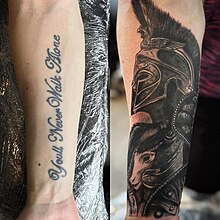
Cover-up tattoos are those done over one or more previous tattoos, scars, or skin conditions.
People cover up old tattoos for a variety of reasons, such as that the tattoos were references to relationships that have ended, the tattoos were nonconsensual, or the tattoos relate to gangs or hate speech. Cover-ups after breakups have received particular attention due to high-profile cases involving celebrities. Cover-ups are one of the two main options of removing an unwanted tattoo, the other being laser removal. Covering up an unwanted tattoo is generally cheaper, less painful and an overall easier solution than tattoo removal.[1]: 104
A decorative cover-up tattoo can obscure a scar or skin condition with personally meaningful art, making it an alternative to more flesh-like paramedical tattoos. For example, in lieu of reconstruction post-mastectomy, a person may choose to get a decorative tattoo over their scars. Self-harm scars are another common target for cover-ups.
Both scars and old tattoo ink present additional challenges for a tattoo artist. Some tattoo artists specialize in cover-ups, and some give free cover-ups for cases such as hate symbols, human trafficking tattoos, and self-harm scars.
- ^ Bryson, David; Wright, Jonathan; Barker, Kimberley (December 2013). "The identification of tattoo designs under cover-up tattoos using digital infrared photography". Journal of Visual Communication in Medicine. 36 (3–4): 104–110. doi:10.3109/17453054.2013.851654. PMID 24252142.